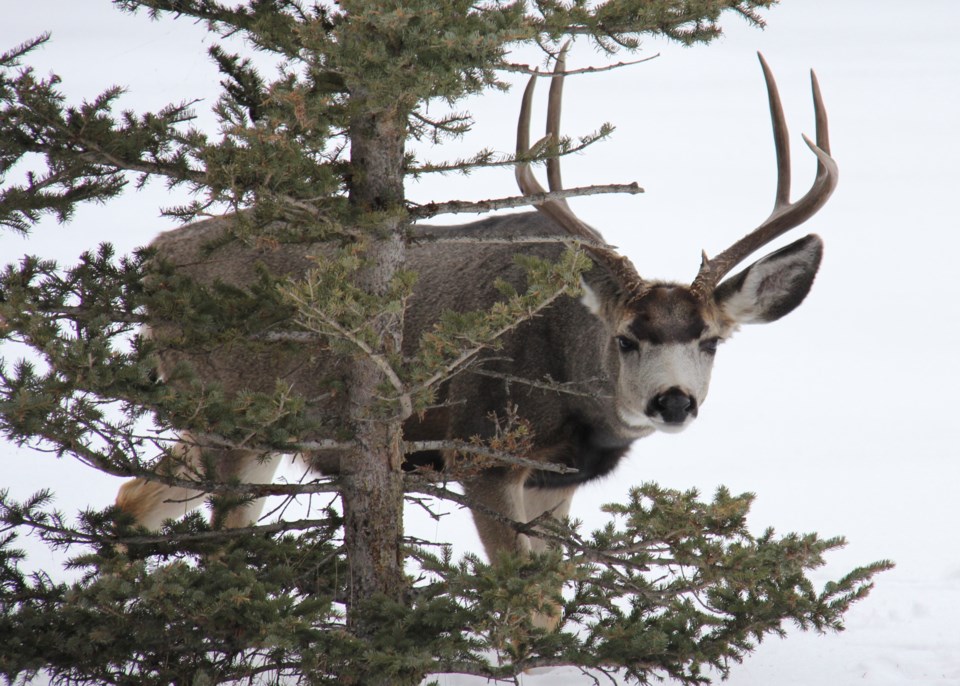Diamond Valley, a town south of Calgary, will not cull its deer, nor will it even consider the idea, according to the Town.
Craig Beaton, operations manager for the Town of Diamond Valley, said that a cull is absolutely off the table.
"To date, the municipality is not considering culling any animals," Beaton said in an interview with the Western Wheel.
"There's residents out there that think that [a cull] is the solution but no, our council, our administration is not even considered culling animals. That is not the solution and I don't think that that's even part of the topic."
Beaton added that even if the Town wanted to, it doesn't have the authority to make that decision.
"Even if a municipality wanted to cull the animals, that isn't a municipal area of authority," he said. "That is probably a provincial wildlife task and I'm sure that they would not approve of a culling of animals."
The possibility of a cull was brought up at last night's council meeting after an email sent by Diamond Valley resident Samantha Istance expressing concern about council's previous discussion of population control measures, including a potential cull.
"I am questioning whether the town council members possess qualifications that would render them experts in wildlife, biology, ecology or related fields to ensure that decisions regarding the co-existence or culling of deer are based on sound scientific principles," reads Istance's email.
"Additionally, I would like to know if there are plans to consult with wildlife experts, ecologists or organizations with relevant experience in managing wildlife populations and further plans to share the findings with the town residents."
Deputy Mayor Brendan Kelly responded, saying, "We asked administration to consult experts because no, we do not believe that we are many of the things listed in her comments."
At the Jan. 17 meeting, council directed Town staff to reach out to Alberta Fish and Wildlife and begin preliminary discussions about potential solutions to the deer population, particularly as it relates to attracting predators to town.
"We're simply just opening the door for a conversation, and I support that conversation," said Kelly at last night's meeting. "But I think that, in large part, this has to come down to the residents as well while this does provide a safe environment for those deer, tossing your compost over the fence may seem harmless for our deer population, but it has real consequences to inviting those deer back into our community."
Coun. Jonathan Gordon highlighted the health and safety risks of the town's deer, primarily their potential to spread disease.
"I'm not a hunter, but I've been reading articles in the Southern Alberta, Southern B.C. region where they have found chronic wasting disease," said Gordon during the meeting. "Just in the B.C., region about two weeks ago, one was in an elk, one was in a mule deer, and that is drastic. And in that article, they referenced studies that show that chronic wasting disease proliferates in the urban deer population.
"That's a major concern that I think has to be part of this issue."
Comparisons to Okotoks were additionally raised at the council meeting.
"If Okotoks has taught us anything, deer problem is not a one and done, it's, if anything, a lifelong learning," said Mayor Barry Crane. "They've been at it for a dozen years, even with the task force in place, and they're yet to have any solution whatsoever, other than we got a couple of designs of higher fences."
The council meeting also touched on deer being attracted to bird feeders as a food source, and the legality of feeding birds was discussed, as they too are considered wildlife.
Council determined that feeding birds is not considered illegal but is highly discouraged because of bird feeders being a deer attractant.
Taking further steps to prevent deer from accessing bird feeders was one possible step that Beaton, who is confident there are solutions outside of a cull, mentioned.
He additionally suggested stricter enforcement of laws against feeding wildlife, strategically making the town more inhospitable for deer and no longer planting fruit-bearing trees, among other ideas.
"I think we all want to just find a solution that will help our communities and our residents," said Beaton. "Honestly, culling animals is not the solution."



